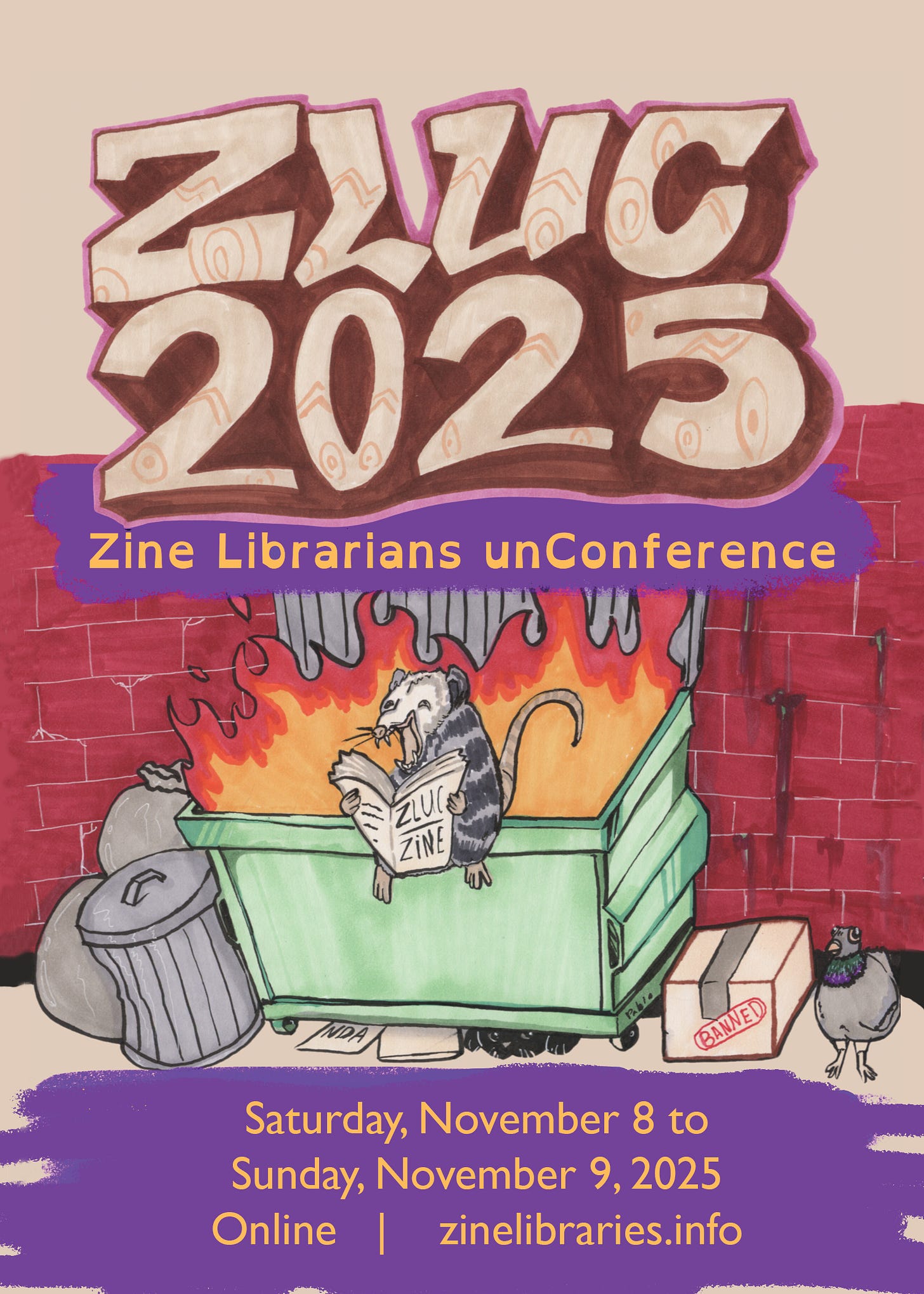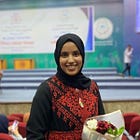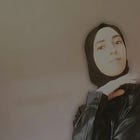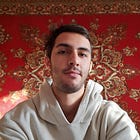Highlights from ZLUC 2025
Coastal Lines Press was a morning presenter on Day 2. The community of zine librarians was very welcoming and responsive. Thank you ZLUC organizers for providing this community-building opportunity.
Information about ZLUC from their website:
The Zine Librarians unConference was held virtually via Zoom on Saturday November 8–Sunday November 9.
The Zine Librarians unConference, a.k.a. ZLuC, is an inspirational, informative, and fun gathering of people who care deeply about zines, their preservation, and their ability to change lives for the better. The unConference uses a broad definition of the term “librarian”- MLIS students, library support staff, zinesters with personal collections, and anyone else in the zine community is welcome and encouraged to attend.
The unConference is held about once a year, and the location and format varies each year. The 2020 ZLuC was also held virtually.
Highlights from our presentation.
Speakers included Leila Boukarim, Shahd Alnaami, Taqwa Al-Wawi, and Ahmad M. Elkhuwaja. Internet service was weak in Gaza, but voice recordings had already been prepared to ensure that the authors located there would still be heard.
Leila Boukarim introduced the collective.
“Coastal Lines is a grassroots, volunteer-driven publishing initiative that was born at the end of this past summer, and in just three months, we have published a dozen zines and have a dozen more in the pipeline. The collective is made up of over 200 people from all over the world, including over 20 authors in and from Gaza, contributing to the project with editing skills, graphic design work, illustrations, translations, marketing and PR, printing and distribution, and, at the heart of all this, is the precious and urgent writing by our friends from Gaza, most of whom are doing this important work under siege and as they survive the occupation’s genocide.
Our zines are designed to be easy and cheap to print, so that anyone with even the most basic printer could print and sell them, and each one includes a QR code that takes readers to the authors’ individual fundraisers, and 100% of the profits go directly to them.
Our name, Coastal Lines Press, honors the Mediterranean Sea, which anchors life in the region, and celebrates the “lines” of language that connect writers to readers worldwide.
Our library is young, but it’s already filled with poetry, essays, short stories, and testimonies, with zines that will at once break and heal you. With the empire flailing as it desperately holds on to power, destroying everything sacred in its path, including the truth, including indigenous narratives, few things feel as important as ensuring these words make their way into as many hands as possible. There’s a reason why billions of dollars are being invested in silencing tactics and the peddling of propaganda. Coastal Lines bypasses systems of gatekeeping and information control, ensuring the unfiltered truth comes to light, and amplifies those voices that have for far too long been silenced.”
Shahd Alnaami’s recording was then played due to an unreliable internet connection. Here’s what she said.
“The whole story started when I was searching for any opportunity that would make me feel that I was making progress, that I was working, that I was alive. So, I started sending messages to my friends, and they did the same, spreading my call to others. That call reached farther than I ever expected, to people I didn’t even know, and it became the first step toward making a dream come true.
One day, I found an email in my inbox from Leila Boukarim, telling me that she had received my call and that she would help me as much as she could. I never thought I would ever reach someone as brilliant as her. I googled Leila and was truly impressed, then followed her on Instagram, wishing we could stay in touch, and that’s exactly what happened. We started chatting about how she could support me. Eventually, she came up with the zine idea. At that time, I didn’t even know what a zine looked like, but I’ve always believed that everything that comes my way happens for a reason, and I should give it a try.
We decided the best thing we could do was to collect all my articles and poems and bring them together in a zine. That’s exactly what we did. Then, I felt the zine needed a cover, so I reached out to my friend, who kindly designed one. I left the final decision to Aude, who chose the cover she would illustrate, and from our conversations, she came up with the beautiful design we have now. Leila edited the zine and asked Zeina to help with the layout. And that’s how we created the first zine from Gaza.
Now, this zine is in its second edition and has been translated into German, Italian, French, Spanish, Portuguese, Finnish, and Turkish, and will soon be translated into Serbian, Japanese, Indonesian, Greek, and more. I am so proud that my zine has reached the whole world. I now have so many friends helping to sell and distribute it across countries, and others are working on translating it into different languages. I’m also deeply proud that this zine led to the creation of Coastal Line Press, where many volunteers have come together to create new zines, united by their love for freedom, their support for Palestinians, and their pure, generous souls.”
Taqwa Al-Wawi spoke next, her youthful voice a startling contrast to the maturity of her writings.
“Hi everyone, and thank you for being here today. I’d like to share a story about how ideas, friendship, and collaboration can build bridges, even across great distances.
It all started when I was introduced to Leila through Shahd. Leila reached out to me personally and shared her idea of creating a zine. She explained what it was, and I immediately said yes, knowing this was a chance to create something meaningful. At that time, I was deeply motivated to share Gaza’s voice with the world. Leila then connected me with Anni, the talented zine designer from Berlin. Even though she was miles away, we stayed in touch through WhatsApp, exchanging ideas and designs.
With Leila’s guidance and support, and Anni’s creativity, we brought the zine to life, a project that amazed and inspired everyone who saw it. Anni’s design beautifully reflected my words, capturing the emotions, and stories of Gaza. Through this experience, I truly understood what it means to build bridges. Even though we were in different cities, our shared trust, creativity, and commitment allowed us to create something powerful and lasting, something that reached people far beyond us.
Thanks to everyone’s efforts, this zine became the second ever published from Gaza. It includes my poems and stories, and it has already reached readers across the world. It has been translated into German and is currently being translated into several other languages. So, building bridges is not only about sharing work, it’s about connecting hearts, exchanging hope, and creating together despite the distance. It shows that when creativity and compassion meet, no border can truly separate us.”
Ahmad M. Elkhwaja then followed with a powerful message to listeners.
I would like to start by asking; Can a starved and displaced 10-year-old child in some blue UN tent somewhere in Gaza talk to George Floyd? Can he see the world standing on his neck? What would their eyes say when they look at each other?
Despite our hopes, oppression and oppressors are still there, moving higher in power than ever. They kill, then they write the headline. They rename the body before it’s even buried.
We often read: “We have successfully deported 100 illegal aliens from the country,” “20 neutralized threats in a recent raid,” “10 people were arrested, obstructing justice.”
Killing machines now can talk, not to help, but to communicate their threats. Double speak is the new language of death, narratives are its grammar, and dehumanization is its goal.
Through fiction, we can open to everyone’s fight in this world: the child in Gaza, the protester in the American street, the displaced in Sudan, the minors in Congo, the student on a campus who refuses complicity.
Fiction teaches us the tools of survival, and the grammar of empathy and shared humanity. It connects across continents, points at the oppressors and their tools, and tells the stories of those who were silenced before us.
Write fiction not to escape reality, but to confront it, to rewrite the language of power itself. Because the child in Gaza and George Floyd, they are still speaking. And if we listen carefully, they might yet teach us how to breathe.”
Learn more about the presenters and support their work.
If you’re a bookseller, bookstore or printing press and want to support this fundraiser by printing and distributing zines, contact the writers directly or email coastallinespress@gmail.com for PDF copies or more information. Proof of donation required. The QR code on each zine serves as the point of sale, and all profits go to the authors.
Follow us on Instagram and Bluesky.
Email us for posters and flyers.
Download our media kit.






